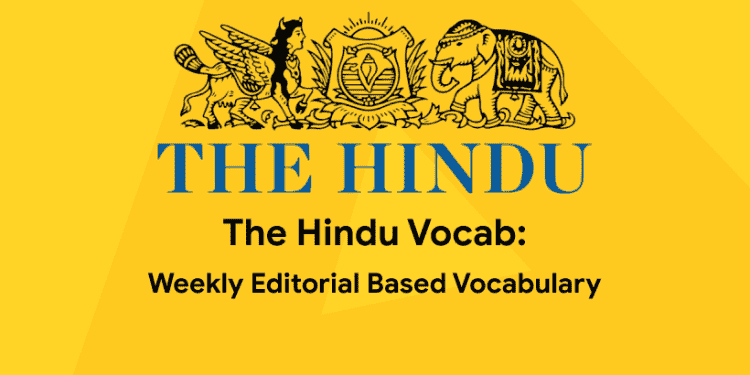We all know that English language plays a crucial role in competitive exams like PSC, SSC, Banking exams etc. So if you are aiming to crack those examination, you should have a strong command in your English language skills. Vocabulary is one of the most crucial topic of English subject. Vocabulary refers to all the words in a language that is known and used by a particular person. It is essential not only for competitive exams, but it is the fundamental tool for communication and acquiring knowledge. In order to help you in improving your vocabulary skills, Entri will provide you with Weekly English Vocabulary based on Hindu editorial every Friday. Reading the daily Hindu editorial is highly recommended for candidates who are aspiring for competitive exams. In this blog, we have given some questions based on Vocabulary with answer and solutions. Check here for Weekly English Vocabulary Based on Hindu Editorial 2020 March 06.
Get free Mock test for Government and Banking Exam!
Weekly English Vocabulary Based on Hindu Editorial 2020 March 06
1. Directions: For each of the words given below, a contextual usage is provided. From the alternatives given, pick the word that is the most appropriate as a substitute in the given context.
Ruse: Overseas criminals use elaborate ruses, including phony websites, to trick job-seekers into helping transfer stolen funds.
(a)Bilk
(b)Hag
(c)Gripe
(d)Ploy
(e)None of these
Solution:
Ruse – a deceptive maneuver especially to avoid capture or an action intended to deceive someone; a trick. (Artifice, ploy, stratagem)
2. Directions : For each of the words given below, a contextual usage is provided. From the alternatives given, pick the word that is the most appropriate as a substitute in the given context.
Dissimulate : From infancy these people have been schooled to dissimulate and hide emotion, and ordinarily their faces are as opaque as those of veteran poker players.
(c)Disguise
(d)Ruse
(e)None of these
Solution:
Dissimulate – hide feelings from other people or conceal or disguise one’s thoughts, feelings, or character. (Disguise, mask)
3. Directions: For each of the words given below, a contextual usage is provided. From the alternatives given, pick the word that is the most appropriate as a substitute in the given context.
Surreptitious: Some Republicans accused the Obama administration of relaxing the standards for debt relief as a surreptitious way of going after the sector and encouraging students to apply for help even if they were ineligible.
(d)Honest
(e)None of these
Solution:
Surreptitious – marked by quiet and caution and secrecy; taking pains to avoid being observed or conducted with or marked by hidden aims or methods. (Furtive, sneaky,clandestine)
4. Directions: For each of the words given below, a contextual usage is provided. From the alternatives given, pick the word that is the most appropriate as a substitute in the given context.
Mettle: The deployment will also test the emotional mettle of soldiers and their families.
(d)Invocation
Solution:
Mettle – the courage to carry on or a person’s ability to cope well with difficulties; spirit and resilience. (Spunk, tenacity, fortitude)
5. Directions: For each of the words given below, a contextual usage is provided. From the alternatives given, pick the word that is the most appropriate as a substitute in the given context.
Obviate: The presence of roller blinds obviated the need for curtains.
Solution:
Obviate – do away with or remove a need or difficulty. (Preclude, prevent, avert)
6. Directions: For each of the words given below, a contextual usage is provided. From the alternatives given, pick the word that is the most appropriate as a substitute in the given context.
Abase: His spokesman Seumas Milne flew to Russia in 2014 to abase himself before Putin and tried to spread conspiracy theories about the Salisbury chemical attack.
(d)Mortify
(e)None of these
Solution:
Abase – cause to feel shame; hurt the pride of. (Chagrin, mortify, humble, humiliate)
7. Directions: For each of the words given below, a contextual usage is provided. From the alternatives given, pick the word that is the most appropriate as a substitute in the given context.
Interdict: Failing to satisfy his examiners, he was interdicted from practice, but ignored the prohibition, and suffered more than one imprisonment in consequence.
(a)Embargo
(b)Avow
(c)Belittle
(d)Inveterate
(e)None of these
Solution:
Interdict – command against or an authoritative prohibition or prohibit someone from doing something. (Proscript, embargo, injunct)
8. Directions: For each of the words given below, a contextual usage is provided. From the alternatives given, pick the word that is the most appropriate as a substitute in the given context.
Invocation: These dances are prayers or invocations for rain, the crowning blessing in this dry land.
(b)Interlocutor
(c)Beseech
(d)Slacken
(e)None of these
Solution:
Invocation – the act of appealing for help. (Appeal, beseech, citation)
9. Directions: For each of the words given below, a contextual usage is provided. From the alternatives given, pick the word that is the most appropriate as a substitute in the given context.
Gripe: If America is going to gripe about the yuan’s rate, then China will complain about the dollar’s role.
(d)Grouse
(e)None of these
Solution:
Gripe – complain about something in a persistent, irritating way. (Grouse, bleat, grumble)
10. Directions: For each of the words given below, a contextual usage is provided. From the alternatives given, pick the word that is the most appropriate as a substitute in the given context.
Munificent: They have shown themselves very loving and generous lately, in making a quite munificent provision for his traveling.
(d)Aggrieve
(e)None of these
Solution:
Munificent – very generous or characterized by or displaying great generosity. (Bountiful, generous, magnanimous)
We hope this blog was helpful for you in improving your knowledge in Vocabulary. Stay tuned with Entri for weekly vocabulary based on Hindu editorial, which will be published every Friday.












